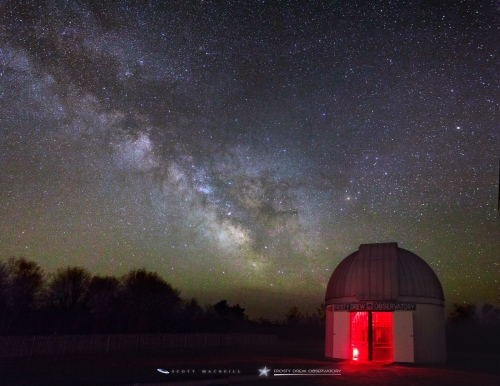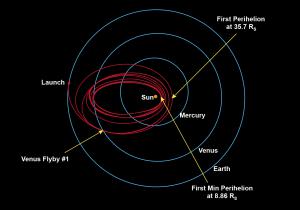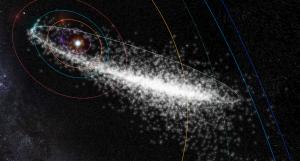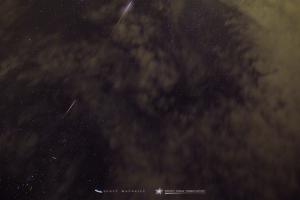
Summer Stargazing Nights - Perseid Meteor Shower
- Where:
- Frosty Drew Observatory
- When:
- Friday August 10, 2018 at 6:00 p.m
- Cost:
- $5 Suggested Donation per person 5 years and older
Tonight is Stargazing Night at Frosty Drew Observatory and forecasts are calling for increasing clouds starting this afternoon. This is super unfortunate since the New Moon is happening tomorrow, which brings super dark skies tonight, as well as the Perseid Meteor Shower peak happening this weekend, which brings dozens to hundreds of shooting stars to the sky tonight. We should be okay with views of the planets through thinner clouds and in between passing clouds, though the Milky Way and the majority of Perseid meteors will be obscured from our view.
We will open the Observatory and Sky Theatre at 6:00 p.m. In the Observatory courtyard we will start on standby as we evaluate conditions for observing the Sun. If acceptable, we will setup our hydrogen alpha telescope offering views of the solar chromosphere. Once the Sun sets, we will direct our telescopes towards the planets, if skies are acceptable. On our list is Jupiter and its four Galilean Moons as well as the Great Red Spot, Saturn’s rings, and views of Mars. If possible, we will attempt binary stars, nebulae, and star clusters if the skies are better than expected. In the Sky Theatre we will be hosting NASA Solar System Ambassador, Frank Puglia, who will be offering a fabulous presentation on stellar evolution and meteors. We will close up at 11:30 p.m. or when clouds chase us out, whichever comes first. On the off chance that the weather will actually permit Perseid viewing, we could stay much later. Check in on our Twitter (@FrostyDrewOBSY) for periodic updates on what conditions look like on site, as well as an “Closing up” update when we decide to pack up for the night.
Overall, tonight is an intense disappointment! For the past two years, we have had massive weather attacks on the Perseid Meteor Shower peak nights, and this year appears to be right on track to do the same. The planets will likely be visible and we could have views of the Milky Way during breaks in the clouds, though the fabulous night we were hoping for is probably not going to happen. If you’re flame is the rings of Saturn, or the moons of Jupiter, then tonight could totally work out for you. Also, if you want to catch sight of Perseid meteors, tonight will probably be the best night at Frosty Drew Observatory to make an attempt, compliments of the weather debacle this weekend.
------------------------
Weekly Happenings
Scott MacNeill
Tomorrow morning, Saturday, August 11, 2018, at 3:33 a.m. EDT the NASA Parker Solar Probe will launch from Cape Canaveral Air Force Station, FL. The Parker Solar Probe will spend six years and eleven months passing through the space in between the Sun and Mercury. Eventually shrinking its orbit around the Sun enough to pass into the solar corona. To do so, the Parker Probe will perform seven flybys of Venus over the duration of the mission. The gravity assists from Venus flybys will alter the probes orbit enough for super close passes to the Sun, with the closest approach coming in at 3.38 million miles distant from the Sun, while traveling at speeds of 125 miles per second. The mission will complete twenty four close passes of the Sun. The mission will enable us to study the solar corona from an insiders point of view, which is where the Sun’s solar wind races into the Solar System. If you’re up waiting for Perseid meteors, tune into NASA TV starting at 3:00 a.m. ET to catch the launch live, then read up on the Parker Solar Probe mission and catch up on all the amazing things this chick will do!
This weekend the annual Perseid Meteor Shower peak will be coming to the skies over planet Earth. One of the best meteor displays of the year, the Perseids can bring an increase of up-to 120 meteors per hour during the peak with perfect conditions. Perfect conditions generally means no Moon above the horizon, super dry conditions – so no haze, crystal clear skies, absolutely no light pollution, and the radiant point of the shower (where meteors appear to originate from, in this case the constellation Perseus) well above the horizon and close to zenith (top if the sky). These conditions easily reside in wishful-thinking-territory for Southern New England. Though the celestial components of these conditions are falling in line nicely this year, notably the New Moon is happening in August 11th. The best night to catch a view of the Perseid Meteor Shower peak will be overnight Sunday night (August 12) – Monday morning (August 13), as this is the night the peak actually occurs. In coastal Southern New England we are under a weather calamity, though if you are in a region with good weather, you are setup for a great display. Find a location with minimal light pollution, and a wide open view of the night sky. So minimal tree cover, buildings, and artificial light. Lay on your back, either in a reclining lawn chair or on a blanket, and direct your view to the zenith (top of the sky) with your feet orientated towards the NE. This will get you the best view of the meteor shower. At Frosty Drew Observatory we have been planning to open for the meteor shower, though weather at this time is placing a grim outlook on that possibility. Check in on our website tomorrow for an update on what we plan to do. Though if you’re under clear skies, have a fabulous night out under hundreds of shooting stars!
If you miss out on the Perseid Meteor Shower peak this weekend due to weather, work, or life; you still have many opportunities to catch a good-to-great view of Perseid meteors. Over the years at Frosty Drew Observatory, we have noted that the Perseid shower put on a fabulous post-peak show. In the week following the Perseid peak, you can still catch hundreds of meteors blazing the sky overnight when conditions are right (no Moon, no clouds, little to no haze). Last summer, I sat out all night on the beach in Newport, RI on the night and morning before the fabulous August 21st Solar Eclipse, and I counted well over 100 Perseid meteors that night. That’s nine days past peak! So don’t go into freak out mode (like I do) if the Perseid peak is beyond your reach. Second chances rock!
-Scott



